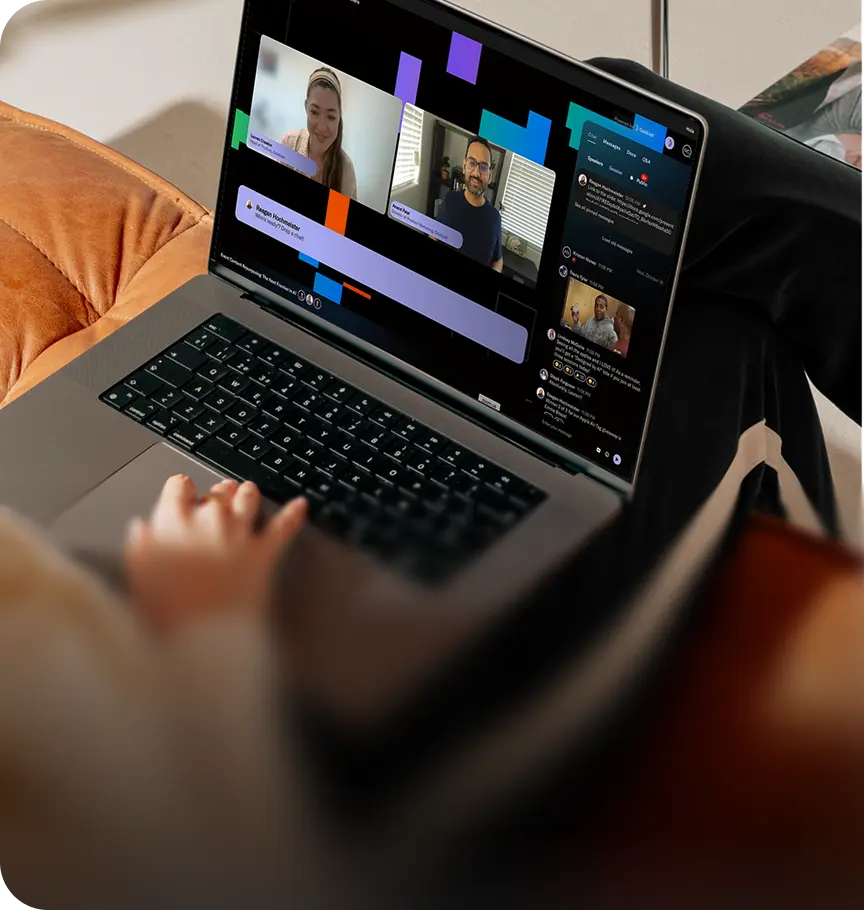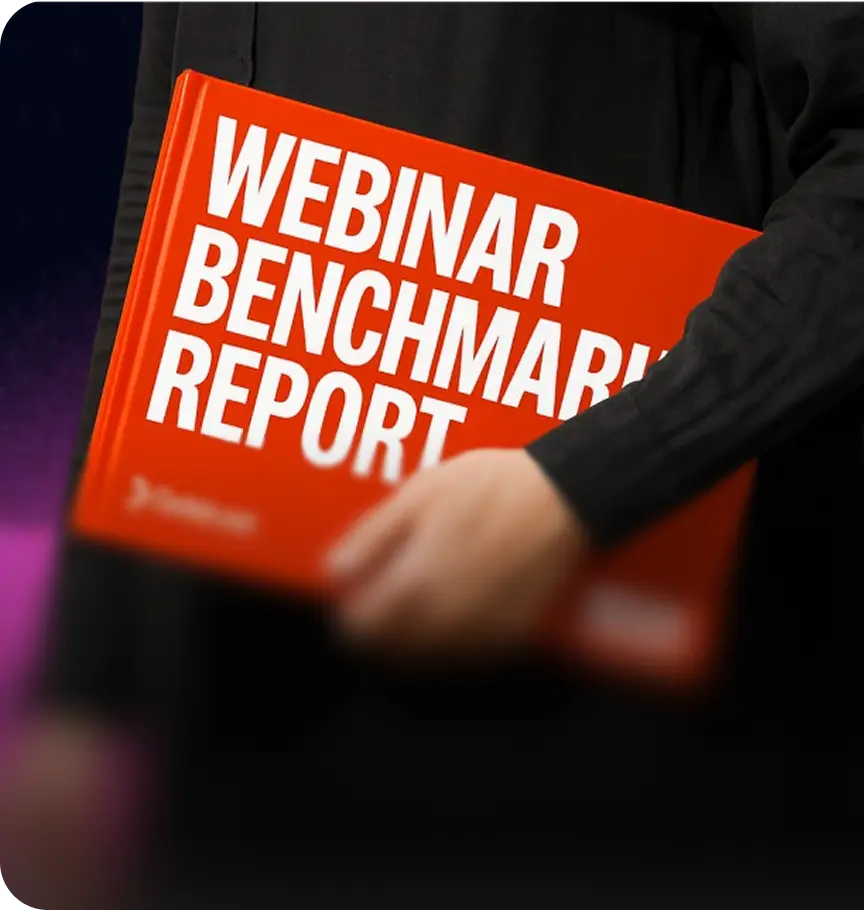TikTok Video Upload Size: The B2B Marketer's Complete Guide

Table of Contents
- TikTok video upload sizes by OS
- Recommended TikTok video aspect ratio and orientation
- Recommended TikTok video resolution
- Recommended TikTok video file format
- Recommended TikTok video length
- Reach more audience members with TikTok video ads
- Top TikTok video tips for B2B marketers
- Quickly repurpose and tailor video clips with Goldcast Content Lab
Maximize Your Marketing ROI
Join 10,000 other marketers already getting the best tips on running engaging events that boost pipeline and create raving fans.
TikTok — it's not just for dance challenges anymore! As more B2B brands embrace an irreverent, up-close-and-personal style of video marketing, TikTok has become a key platform to reach and connect with diverse audiences.
However, if you've spent any time on TikTok, you know that it's a BIG change from the land of LinkedIn or even Facebook. The TikTok algorithm loves short, snappy clips, and you'll need to deliver on both that and the platform's specific technical requirements.
If that sounds like a lot to navigate, don't worry! In this guide, we'll break down everything you need to know about TikTok video specs. Plus, we'll share some expert tips on how to repurpose your existing video content to make the most impact on TikTok.
Read on to learn:
- TikTok video upload sizes by OS
- Recommended TikTok video aspect ratio and orientation
- Recommended TikTok video resolution
- Recommended TikTok video file format
- Recommended TikTok video length
- Reach more audience members with TikTok ads
- Top TikTok video tips for B2B marketers
- Quickly repurpose and tailor video clips with Goldcast Content Lab
The clock is tick-tocking, so let's get started!
TikTok video upload sizes by OS
Let's get this out of the way first. The size of video you can upload to TikTok is dependent on what type of operating system you have.
Here are the maximum file sizes for:
- Android devices: 72 MB
- Apple iOS: 287.6 MB
- Desktop computers: 10 GB
These sizes obviously vary wildly! If you're wondering why, it has to do with the size of the file produced by each OS. On an iPhone, users generally create and upload MOV file formats, which take up more space than MP4s, which are created by Androids.
One other note: While uploading a video on your computer gives you a lot more range in size, smaller videos tend to upload faster and play well across all devices. Don't think that bigger necessarily means better in this case!
Recommended TikTok video aspect ratio and orientation
TikTok recommends a 16:9 aspect ratio for landscape videos and 9:16 for vertical videos.
That said, vertical videos are a natural fit because they fit most smartphone screens perfectly. Vertical videos maximize the amount of real estate your video takes up, which is a good thing. Viewers don't have to rotate their phones or crane their necks to see your video, and there's no empty space on the screen, making for a full-screen viewing experience.
Recommended TikTok video resolution
Full HD resolution, or 1080 (sometimes listed as 1080 x 1920 pixels) is the best option for TikTok. These play better on all devices and look great.
There is, however, a balance to strike between the quality of the video and the size of the file. Remember that bigger files can cause playback and buffering issues, so you want to experiment to see what works best.
Recommended TikTok video file format
TikTok supports most major file formats, including MP4, MOV, MPEG, 3GP, and AVI. The social media platform recommends going with MP4 whenever possible; this is because of the aforementioned balance between file size and quality. MP4s are typically smaller in size than other formats, making them a good choice for uploading and sharing.
Recommended TikTok video length
There is no one-length-fits-all recommendation here. The maximum video length is 10 minutes for mobile uploads and 60 minutes for web uploads. The shortest a video can be is just one second.
The right length for you will depend on your audience and the goal of your video. Keep in mind that shorter content often performs better than longer videos, and succinct content is what TikTok is known for.
The company itself recommends aiming for 21-34 seconds per video (this guidance is for in-video ads, but it likely applies across the board).
Reach more audience members with TikTok video ads
If you're looking to advertise on TikTok, here's what you need to know:
- Video size: up to 500 MB (you can also create image-only ads in TikTok)
- Aspect ratio: 9:16, 1:1, or 16:9
- File types: same as other videos (MP4, MOV, MPEG, 3GP, AVI)
- Available ad formats include in-feed ads (the most common type), TopView ads (which play upon opening the TikTok app), branded hashtag challenges that appear on the Discover page, and more.
- You're responsible for researching any applicable laws and guidelines for your industry before posting.
- Cost is determined via an auction-based bidding system and depends on the type of ad and how much visibility you're getting.
With TikTok seeing around 2.5 billion visits each month, it might make sense to designate some of your ad budget toward the platform and see if it pays off!
Top TikTok video tips for B2B marketers
While knowing the technical stuff is a start, there's much more involved when it comes to making an impression on TikTok. Some of these lessons apply to other platforms but TikTok favors brevity and off-the-cuff content more than LinkedIn, which is where most B2B marketers honed their posting skills.
Use these tips as a starting point:
Optimize primarily for mobile
You can access TikTok via a web browser, but most people we talked to prefer using their phone. Prioritize accordingly by choosing vertical video formats, being mindful of how long text blocks are, and watching anything you upload on your phone to be sure it's mobile-friendly.
Use these file formats to reduce upload size
Even if TikTok accepts your large video file, bloated file sizes can lead to poor playback experiences for your audience. If you're having issues, there are a few different things you can try to reduce video file size.
First, you can use a tool like Adobe or CloudConvert to convert your video file to MP4, the recommended TikTok format. You could also try compressing videos before you upload or experimenting with lower bitrate quality. "Bitrate" refers to the level of clarity in a video file, and higher bitrates mean bigger file sizes.
Include closed captions or subtitles
According to one survey, 88% of TikTok users think sound is critical to the TikTok experience. Open the app and you'll immediately be hit with a wave of music and chatter. However, don't let that deter you from creating accessible content that everyone can enjoy!
Add captions or subtitles to your content so that people who prefer a sound-off experience and those that rely on captions and subtitles can still consume your videos. Beyond accessibility, well-written captions can help enhance your brand voice and make your video more engaging.
Choose high-engagement video clips
TikTok moves fast, and you need to capture folks' attention right away. When you're looking for clips to post on the platform, be on the lookout for the most dynamic, attention-grabbing moments. We're talking clips that tell a complete story in just a handful of seconds. The goal is to stop people from scrolling, and it takes a lot to do that!
Keep it simple
TikTok users favor genuine content over highly produced, scripted videos. Even if your main goal is to educate audience members on your product or service, the fastest way to do that is through an emotional connection.
Try talking directly to the camera and showing up as you are — no need to dress up in a polished suit for your first video if that's not your everyday wear!
Partner with content creators if possible
If you've got a relationship with an influencer or TikTok creator, try partnering with them to spread your message even further. (Be sure to compensate folks for their time!) There are lots of business accounts on TikTok at this point, so you've likely got some options to work with.
Some ideas: Lean on a current customer and ask them to share about why they love your brand or how they use your product. Pay an influencer to try your product or service and review it. Collaborate with a partner to do a giveaway that boosts both of your followings.
You might even get lucky and realize that there are users on TikTok already posting about your brand — if this is the case, be sure to reshare those posts to start building your credibility!
Pick the right editing tools
There are lots of tools you can use to help you along your TikTok journey. Goldcast Content Lab leverages the power of AI; it allows you to take one of your event or webinar videos and repurpose it within seconds into high-energy clips you can then edit, resize, style, and post on TikTok. This can help you create a foundation of posts and start to learn what works best on the platform without having to create new video content.
BTW: The free version of Content Lab is always, well, free. Sign up today and give it a spin!
Quickly repurpose and tailor video clips with Goldcast Content Lab
Even if you're new to the world of TikTok, building a platform presence doesn't mean you have to start from scratch.
As a B2B marketer, you've likely got tons of engaging content at your fingertips from past events, conferences, panels, webinars, and other sessions. Content Lab allows you to take those videos and slice and dice them into all kinds of TikTok posts!
Specifically, Content Lab can help you:
- Find the peak-energy moments in your best videos
- Create high-quality, feed-ready content
- Add captions and subtitles for maximum accessibility
- Save hours of time and free you up to focus on high-level strategy
Ready to get noticed on TikTok? Try the free version of Content Lab and start turning your video library into engagement-driving posts on TikTok!
Transform Your Video Marketing with AI
Stay In Touch
Platform
Resources
© 2025 Copyright Goldcast, Inc. All rights reserved.





 Upcoming Events
Upcoming Events Event Series
Event Series On-Demand Events
On-Demand Events

